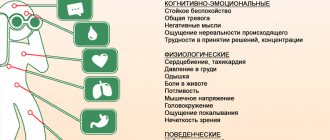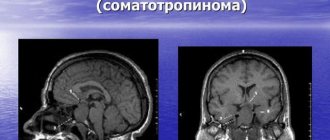Increased libido in women or nymphomania is a special type of sexual disorder in which a woman is too active in sex and constantly experiences the sensation of not having enough sex. Nymphomania is not part of the character, as the older generation believes, it is a serious illness that requires urgent attention to a specialist. Such a disease causes discomfort not only to the woman, but also to her partner, because she demands more from him than he can. The problem is that after each sexual intercourse, testosterone and estrogen levels return too quickly, causing the woman to feel a new need for sex.
The concept of increased libido: what is it?
For the first time in his life, a person encounters hypersexuality in adolescence: it is at this time that the psyche tends to focus on erotic fantasies, which, for example, in young men is explained by the increased production of such a sex hormone as testosterone. Increased excitability may be accompanied by the occurrence of an erection or a physiological phenomenon called emission - all this, on the one hand, introduces a state of nervous tension, on the other hand, helps the maturing individual to realize his sexual role, which is extremely necessary for the formation of normal sexual functions in the future. life.
Often, excessive attraction begins to manifest itself in a more mature period, and in this case the situation becomes ambiguous. First of all, it should be understood that the very concept of “balanced libido,” so to speak, has a very conditional meaning. If a person leads an active sex life, but also succeeds in other areas of life, it would be wrong to call his sexual desires a pathology. However, in a situation where increased desire radically changes the behavioral characteristics of an individual, and the need to obtain such pleasure takes a central position and prevails over other interests, it is worth talking about sexual dysfunction.
This pathology is characterized by a number of far from pleasant phenomena:
- the occurrence of too frequent and obsessive sexual desire;
- constant need to change sexual life, and, in particular, to get a new partner;
- desire to perform multiple sexual acts during the day;
- showing interest in sexual orgies.
A person who is characterized by such behavior causes discomfort and real suffering not only to his partner, but also to himself. The problem can be solved with the help of special medications, but first you need to make sure that the existing deviations actually relate to the topic of increased libido. Knowledge of certain signs inherent in this pathology will help you find out about this.
Methods for reducing female libido
Before asking how to reduce libido in women, it is necessary to identify the cause of the pathological process. To do this, the general condition of the body is assessed. An analysis is performed to determine hormone levels.
An ultrasound examination is performed to identify pathologies of the internal genital organs. A scheduled visit to a gynecologist is also recommended.
To eliminate complications of the pathology, a consultation with a psychologist is carried out.
If the problem is hormonal imbalance, it is necessary to take appropriate medications. In some cases, sexual desire is reduced by treatment with folk remedies and diet therapy. Experts recommend directing energy in another direction - sports or any other hobby.
Medicines
Increased sexual desire can be reduced with medications. Tablets should be taken only after consultation with a specialist. The optimal solution is the selection of hormonal oral contraceptives. They suppress the growth of estrogen and block ovulation.
Before starting treatment, a woman undergoes a general examination of the body, which allows identifying contraindications for use.
The most common oral contraceptives include:
- Marvelon;
- Janine;
- Yarina;
- Regulon;
- Novinet;
- Jess.
In some cases, antidepressants help cope with increased excitability. But before using them, you should familiarize yourself with the list of side effects. Among them are: Fluoxetine, Amitriptyline, Phenelzine, Moclobemide.
Drugs are selected exclusively by the attending physician.
In complicated situations, tranquilizers are prescribed - Prozac, Paxil or Zoloft. Adrenaline blockers: Proscar and Propecia also cope well with excitement.
Taking them plunges a woman into a state of apathy. If the problem is caused by epilepsy, anticonvulsants are prescribed, which include Tofranil, Imizin and Elavil.
The average duration of hormone treatment is 6 months. Sometimes it is increased to 3 years.
Folk remedies
Folk remedies that reduce libido help enhance the effectiveness of drug treatment for female nymphomania. Among them is a decoction of oregano. To prepare it, 1 tbsp. herbs are poured with 2 glasses of hot water. Within 2 hours the drink is ready. It should be taken 60 ml 3 times a day.
Another effective remedy is considered to be an infusion of water lilies. 2 tbsp. pour a glass of boiling water over the herbal mixture. After 2 hours the drink will be ready for consumption. Its single dosage is 2 tbsp. The optimal number of doses per day is 3-4 times.
An alternative to water lily infusion is a drink made from hop cones. It is taken half a glass three times a day.
Nutrition
Introducing foods that lower libido into the diet is not advisable. They have a negative impact on the entire body as a whole.
It is enough to stop eating foods that have a stimulating effect on the production of sex hormones. These include: seafood, spices, olives, spicy foods, avocados, figs and garlic.
Physical activity
An active lifestyle helps you release pent-up energy. After an intense workout, a woman feels very tired, which reduces the need for sex. It is important not to overload the body, which will not aggravate the problem.
Gym classes, swimming, yoga, fitness and Pilates are encouraged. It is also recommended to limit the amount of sleep you get.
Increased libido may seem like a positive feature only at first glance. In fact, deviation greatly interferes with a woman’s life. If symptoms of this phenomenon appear, you should immediately consult a doctor. The right approach guarantees the restoration of sexual desire to acceptable limits.
Increased libido in women: signs
Too frequent sexual desire in women is usually called nymphomania. This phenomenon among the weak half of humanity is much less common than its opposite condition - frigidity. Sometimes it can be difficult even for specialists to distinguish between natural temperament and real hypersexuality, but in practice there are still a number of behavioral features that may indicate the presence of sexual dysfunction in a woman.
- The focus of interest on obtaining sexual pleasure often interferes with realization in other areas of life: professional, social, family, spiritual, creative.
- The topic of sex becomes central, interest in it in thinking and conversations is expressed almost constantly.
- Women with increased libido experience incomplete sexual satisfaction; it is for this reason that she may have several sexual partners. This is often accompanied by a desire for intimacy with new lovers, with whom sex life is usually conducted in parallel.
- A state of general emotional exhaustion sets in, and chronic fatigue syndrome begins to make itself known.
However, the most important sign that increased libido has become pathological is the occurrence of sexual desire too often and sexual intercourse without achieving a feeling of satisfaction.
Register now and receive a gift!
Decreased libido has two negative consequences.
Firstly, men don't really like it. And if this problem is not solved, everything can end sadly for such relationships.
Secondly, and more importantly, decreased libido is a sign that something is going wrong in the body. In most cases, this is a hormonal imbalance to one degree or another.
And this negatively affects the health of the entire body and significantly reduces the quality of life.
Therefore, you should not let this problem take its course.
Now we will figure out how to increase libido in women - do it simply, quickly and without drugs.
:
Do you really have a problem?
Just because your libido is lower than your partner's doesn't mean you have a problem.
We all have different hormonal levels and our sexual needs may vary within reasonable limits.
However, differences in sexual activity can create concerns and even problems in relationships.
If the difference is not significant, you shouldn’t worry too much about it, especially at the beginning of a relationship. As practice shows, the libido of partners evens out over time (if the difference was not large).
The following symptoms should alert you::
- If you are not interested in any type of sexual activity, including masturbation;
- Never or very rarely have sexual fantasies or thoughts;
- Significant difference in sexual needs with your partner;
- Concerned about your low libido;
If you notice one of these symptoms, do not rush to look for pills to increase libido. In order to deal with the problem, you first need to determine the cause.
Diagnostics
In order to understand the causes of low libido, it is advisable to undergo an initial diagnosis. Most often, these are hormonal imbalances of varying degrees, but other factors cannot be ruled out.
When complaining of low libido, women are advised to:
- Have a gynecological examination. You need to make sure that there are no physiological changes that will reduce sexual desire. This could be vaginal atrophy, dry mucous membranes, or some kind of disease.
- Get tested. First of all, this concerns sex hormones, thyroid condition, diabetes, lipid profile and liver diseases.
- Contact a psychiatrist or psychologist if the decrease in libido is caused by psychological rather than physiological factors.
Causes of low libido in women
A woman's sexual desires naturally fluctuate with age. Peaks and valleys of sexual activity usually coincide with the beginning and end of a relationship, pregnancy, menopause and various illnesses.
Physiological reasons:
- Wrong lifestyle;
- Lack of nutrients;
- Stress, depression;
- Diseases of the pelvic organs;
- Other diseases that can affect hormonal levels;
- Sexual problems (pain or discomfort during intercourse or orgasm);
- Taking certain medications (such as antidepressants);
- Previous operations on the mammary glands or pelvic organs;
- Menopause;
- Pregnancy and breastfeeding.
Psychological reasons:
- Diffidence;
- A critical attitude towards sex or one's appearance;
- Experience of sexual assault or rape;
- Unsuccessful sexual experience in the past;
- Poor relationship with your partner, constant quarrels;
- Shyness.
So, below are 7 ways to increase libido in women.
Aphrodisiacs for women
Aphrodisiacs are substances that stimulate sexual desire and activity. Some may work better for you, some may work worse. So it makes sense to try everything. Plus, in addition to specific foods, you need to reconsider your diet as a whole.
Spicy food
It dilates blood vessels well and increases blood flow throughout the body, including to the pelvic organs.
In India, people have been eating spicy food since ancient times, maybe that's why they came up with the Kama Sutra? Try adding red pepper to your dishes and see the results.
The main thing is not to overdo it, since spicy food stimulates the nervous system and, if you are not used to it, in large quantities can cause insomnia.
Chocolate or cocoa
Cocoa contains substances that can increase libido: arginine, methylxanthines and phenylethylamine.
Although recently, scientists have found that the stimulating effect of chocolate is rather psychological. (1)
But what do we care? The main thing is that it works
Source: https://www.nabodryake.ru/kak-povysit-libido-u-zhenschin/
Symptoms of the phenomenon
The phenomena discussed above are a clear symptomatic picture of increased sexual desire. A woman who experiences constant sexual desires not only focuses her thoughts and fantasies on the topic of intimacy, she strives for their realization: to perform frequent and prolonged sexual intercourse, as well as to search for more and more new partners.
In medical practice, there are cases when, against the backdrop of an increased need for sex, the weaker half of humanity experiences a slight increase in body temperature, insomnia, irritability, aggression, a decrease or, conversely, an increase in appetite - all these are phenomena that arise due to emotional exhaustion of the body, which , in turn, occurs due to a feeling of constant dissatisfaction.
Women who experience nymphomania in their youth are absolutely sure that the increased libido that is characteristic of them is nothing more than a virtue, because many men are attracted to hypersexual partners. However, with age, the existing problem becomes more pronounced; there are cases when nymphomania accompanied a woman for most of her life, right up to old age.
Changes in the body at 4 weeks of pregnancy
Already the 4th week of pregnancy brings some women various changes in well-being. This may include irritability, increased fatigue, drowsiness, and in the physical sphere - swelling of the mammary glands, increased sensitivity of the nipples, and an increased urge to urinate. All these changes are caused by the active work of organs that are preparing for bearing a baby and childbirth, mainly the corpus luteum in the ovary. Approximately 2 weeks after fertilization, the presence of an embryo in the body will indicate that the woman is not menstruating. At this time, hCG, human chorionic gonadotropin, appears in her body, the presence of which in the urine clearly indicates pregnancy.
Causes
Changes characteristic of sexual function in adolescence and young adulthood are considered a natural physiological phenomenon. But the later appearance of increased libido makes you think about existing disorders and possible reasons underlying the pathological picture.
Let's look at them:
- Diseases of the endocrine system, accompanied by an excessive increase in the level of sex hormones, as well as adrenal hormones, which subsequently leads to hypersexuality.
- Brain injuries, previous encephalitis or meningitis, which affected the activity of the hypothalamus. This structure is directly responsible for the formation of libido, so any disturbances in this part of the brain will certainly result in sexual dysfunction.
- Mental disorders: schizophrenia or manic syndrome, usually due to improper functioning of the brain, as well as due to some strong emotional shock.
- Psychological problems, often originating from childhood or adolescence: this may be due to a lack of parental attention or an unsuccessful first sexual experience. Low self-esteem with its characteristic feeling of self-doubt will only aggravate the existing deviation.
Nymphomania formed due to one of these factors is called acquired by experts. Typically, this phenomenon can be corrected with medication, so if you have the slightest suspicion of this pathology, you should immediately consult a doctor in order to receive all the necessary recommendations and appropriate treatment prescriptions.
Treatment
The treatment process, first of all, should begin with a visit to the doctor - this is necessary to establish the cause that caused the increase in libido. After talking with the patient, assessing his psycho-emotional state, and also finding out some points that may influence the development of the pathology, the doctor will necessarily send the complaining person for additional examination.
Since increased sexual desire is often caused by hormonal disorders, the first on the list of recommended diagnostics will be laboratory tests aimed at identifying hormone levels. In addition, a person pursuing the goal of reducing libido can be redirected to other specialists, for example, to a psychologist if the cause of the pathology lies in personal problems, a psychotherapist when there are various types of mental disorders, or to a neurologist if there have been previous brain injuries .
Depending on the factor that provokes an increase in libido, appropriate therapy is prescribed: hormonal drugs, psychotropics or other drugs that also correct brain activity.
As additional measures, it is recommended to adhere to the following points:
- organize your daily routine;
- normalize sleep;
- exercise regularly, play sports;
- adjust areas of vital interests;
- eliminate stressful situations, avoid a tense neuro-emotional state.
Some herbal remedies are a real help, from which you can prepare special decoctions - oregano, St. John's wort, mint, licorice root, hop inflorescences, water lily flowers. To make such an infusion, you need to take 1-2 tablespoons of any raw material and pour a glass of boiling water, then take the resulting liquid in small portions throughout the day.
General recommendations
The fourth week of pregnancy refers to its first trimester, which is a very important period that largely determines the future health of the baby. At this time, literally everything can influence the development of the fetus - the cleanliness of the mother’s environment, her sleep and wakefulness patterns, diet and many other factors. Therefore, she must understand that she needs to change her attitude towards many things that were previously unimportant for her, and be very balanced in her every action and even thought. Literally everything should now be subordinated to one goal - to bear and give birth to a healthy child. Of course, you will have to give up many things that used to be the little joys of life for mom. Late gatherings on the Internet, favorite spicy dishes, fitness, meeting a friend for a glass of wine at the end of a hard work week - you will have to forget about all this for now. But in return, the expectant mother receives the happiness of waiting for the birth of her baby, incomparable for a woman.
Increased libido during pregnancy
When it comes to sexual function during pregnancy, there are usually two contradictory conditions that women may experience. Some representatives of the fairer sex become more frigid, while others, on the contrary, feel increased sexual desire - such fluctuations depend on the individual characteristics of each organism.
In general, it can be noted that almost every woman during the first trimester of pregnancy is characterized by a weakening of sexual interest, which is associated with a real hormonal explosion that occurs at this stage. Such an event is very often accompanied by rapid fatigue and drowsiness, fatigue and emotional instability, a feeling of nausea and dizziness - these phenomena are a logical consequence of hormonal changes in the body. Feeling a general malaise, experiencing fear and anxiety, the pregnant woman concentrates all her attention on the unborn child, and not on the topic of intimacy.
However, closer to the second trimester, libido begins to gradually increase, and some natural circumstances contribute to this. Thus, the increased blood flow against the background of rising hormones helps to increase the sensitivity of the vagina. Along with this, engorgement of the mammary glands occurs, which also increases sexual desire just by touching them.
Increased libido during pregnancy is not a sign of pathology. As a rule, this period of time, accompanied by hypersexuality, does not harm the relationship of a married couple, but, on the contrary, only strengthens it.
What is libido?
This term is known due to Freud's theory and refers to sexual desire in women. The media imposes the image of an impeccable girl - sexy and temperamental, one who is easy to persuade to be intimate. But in everyday life, many representatives of the fair sex are not aimed at romantic and sexual relationships, but, on the contrary, prefer to live alone.
However, the absolute absence of sexual desire is a rather rare pathology, which is called frigidity, and its decrease is a fairly common phenomenon. Those who are wondering how to increase libido in women should remember that a healthy lifestyle plays a big role in solving this problem.
Increased libido before menstruation
Hormonal changes are also associated with an increase in sexual desires in different phases of the menstrual cycle.
During numerous observations, experts established the following dynamics:
- from 7 to 11 days, that is, during the period coinciding with the end of menstruation, sexual desire begins to gradually increase;
- from 12 to 15 days, when the level of androgens in the blood increases significantly, libido continues to increase;
- ovulation period - usually sexual desires reach their peak at this time;
- the final stage of the menstrual cycle, which begins on the 19th day: libido is maintained at a high level, but its duration is short-term.
In most cases, immediately before the onset of menstruation, sexual desire sharply decreases, but the opposite phenomenon can also be observed when a woman’s interest is focused exclusively on the topic of intimacy. As a rule, this does not indicate any malfunction, but rather only indicates the individual characteristics of the body.
Condition of the fetus at 4 weeks of pregnancy
At this time, the baby is actively developing extra-embryonic organs, which include the chorion, amnion and yolk sac. To people far from medicine, these names mean nothing. However, without these organs the baby simply will not be able to develop. It is the extraembryonic organs that develop in the 4th week that will subsequently provide the fetus with nutrition, respiration, biochemical support and protection from the negative influences of the environment. The placenta will subsequently be formed from the chorion, and the amnion will become the fetal sac.
I think dads will be pleased to know that in the creation of these important organs, the role of paternal genes is more active compared to maternal ones. That is, even at this level, nature emphasizes that the main task of a man is to ensure the life and protection of those for whom he is responsible.
Externally, the baby is still a flat disc consisting of several layers, each of which in due time will turn into some kind of organ or tissue.
Symptoms of increased libido in men
Just like among the fairer sex, an increase in the sexual desires of men begins in adolescence, when the process of active production of sex hormones begins. The so-called puberty period, which occurs after 12 years, is expressed in unbridled intimate fantasies, the phenomenon of wet dreams and unpredictable erections.
Over time, as we grow older, such features stabilize and become moderate, but sometimes deviations can be observed, which manifest themselves with the following symptoms:
- erotic desire that occurs too often;
- sexual intercourse with an accompanying rapid erection or lack of orgasm;
- focusing on an intimate topic and moving it to the fore;
- the desire to take possession of your partner without her voluntary consent;
- pathological interest in pornography;
- increased excitability of the nervous system;
- uncontrolled attraction, accompanied by a constant change of partners;
- multiple sexual acts in one day;
- decreased activity in other areas of life.
Often, libido increases in men in old age, which is explained by experts as a fear of one’s own aging, as well as a way to assert oneself, an attempt to prove not only to oneself, but also to one’s partner, one’s masculine ability.
Possible reasons
Any failure that occurs in the body has its justification. Excessively high libido is recognized by experts as a pathology, and this phenomenon also has a number of reasons that can cause it. The most common factors include problems inherent in the endocrine system, this also includes neurological diseases, psychological complexes or mental disorders.
So, the following can provoke erotomania in the stronger half of humanity:
- hormonal disorders, excessive amounts of hormones produced by the adrenal glands;
- brain injuries or diseases: dysfunction of the hypothalamus or other centers, vascular disease, cancer;
- long-term drug addiction, use of potent drugs;
- psychological complexes or traumas: low self-esteem, inferiority complex, feeling of inadequacy of one’s personality;
- mental disorders: hypomania, schizophrenia.
Particular attention should be paid to such a psychological phenomenon as pseudo-hypersexuality, in which a man who has any personal problems compensates for them by asserting himself through sexual intercourse with numerous partners.
The following circumstances are a direct explanation for this:
- flaws in appearance;
- erection problems;
- underestimation of personal sexuality;
- dissatisfaction with the size of the genital organ;
- bad experience with a regular partner.
In addition, in this situation, libido can be influenced by life’s troubles, lack of maternal love, as well as the impossibility of self-realization in other areas - creative or professional.
Treatment
How to increase sexual desires - many men are informed about this, thanks to the advertising of special modern drugs, but perhaps not everyone knows how to reduce sexual activity. Treatment of this pathology is selected individually, taking into account the patient’s complaints, as well as the causes of sexual dysfunction.
Among the most common medications are the following groups of drugs:
- neuroleptics (“Chlorpromazine”);
- tricyclic antidepressants (“Fluoxetine”);
- antiandrogen drugs (“Propecia”);
- serotonin reuptake inhibitors (Paroxetine").
A strong sexual desire that causes a lot of trouble is a serious reason to contact a sexologist. By completing a course of drug therapy, you can get rid of the obsessive problem forever. If you choose a systematic approach to solving the problem: using traditional medicine and reorienting your lifestyle, the decrease in libido will occur much faster.











